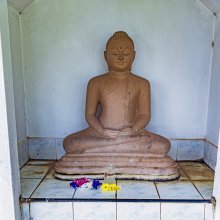Siti, Śiti, Sīti, Shiti: 18 definitions
Introduction:
Siti means something in Buddhism, Pali, Hinduism, Sanskrit, Marathi, Hindi, biology. If you want to know the exact meaning, history, etymology or English translation of this term then check out the descriptions on this page. Add your comment or reference to a book if you want to contribute to this summary article.
The Sanskrit term Śiti can be transliterated into English as Siti or Shiti, using the IAST transliteration scheme (?).
Images (photo gallery)
In Hinduism
Ayurveda (science of life)
Nighantu (Synonyms and Characteristics of Drugs and technical terms)
Source: WorldCat: Rāj nighaṇṭuSiṭī is another name for Mūrvā, a medicinal plant identified Marsdenia tenacissima from the Asclepiadoideae or “milkweed family” of flowering plants, according to verse 3.19-21 of the 13th-century Raj Nighantu or Rājanighaṇṭu. The third chapter (guḍūcyādi-varga) of this book contains climbers and creepers (vīrudh). Other than the foreign word Siṭī (as common in Thārū), there are more synonyms identified for this plant among which thirty are in Sanskrit.

Āyurveda (आयुर्वेद, ayurveda) is a branch of Indian science dealing with medicine, herbalism, taxology, anatomy, surgery, alchemy and related topics. Traditional practice of Āyurveda in ancient India dates back to at least the first millenium BC. Literature is commonly written in Sanskrit using various poetic metres.
In Buddhism
Mahayana (major branch of Buddhism)
Source: archive.org: Bulletin of the French School of the Far East (volume 5)Siti (सिति) [?] [or Ṣadhi, Śiti ?] (in Chinese: Chai-t'i) is the name of an ancient kingdom associated with Śravaṇā or Śravaṇānakṣatra, as mentioned in chapter 18 of the Candragarbha: the 55th section of the Mahāsaṃnipāta-sūtra, a large compilation of Sūtras (texts) in Mahāyāna Buddhism partly available in Sanskrit, Tibetan and Chinese.—Chapter 18 deals with geographical astrology and, in conversation with Brahmarāja and others, Buddha explains how he entrusts the Nakṣatras [e.g., Śravaṇā] with a group of kingdoms [e.g., Siti] for the sake of protection and prosperity.

Mahayana (महायान, mahāyāna) is a major branch of Buddhism focusing on the path of a Bodhisattva (spiritual aspirants/ enlightened beings). Extant literature is vast and primarely composed in the Sanskrit language. There are many sūtras of which some of the earliest are the various Prajñāpāramitā sūtras.
Biology (plants and animals)
Source: Google Books: CRC World Dictionary (Regional names)Shiti in Latin America is the name of a plant defined with Arundo donax in various botanical sources. This page contains potential references in Ayurveda, modern medicine, and other folk traditions or local practices It has the synonym Aira bengalensis (Retz.) J.F. Gmel. (among others).
Example references for further research on medicinal uses or toxicity (see latin names for full list):
· Systema Naturae (1791)
· Acta Phytotaxonomica et Geobotanica (1941)
· Phytologia (1978)
· The Flora of British India (1896)
· Flora Helvetica (1828)
· Grasses of Burma (1960)
If you are looking for specific details regarding Shiti, for example diet and recipes, extract dosage, pregnancy safety, chemical composition, side effects, health benefits, have a look at these references.

This sections includes definitions from the five kingdoms of living things: Animals, Plants, Fungi, Protists and Monera. It will include both the official binomial nomenclature (scientific names usually in Latin) as well as regional spellings and variants.
Languages of India and abroad
Pali-English dictionary
Source: Sutta: The Pali Text Society's Pali-English DictionarySīti°, see sīta. The word sītisiyāvimokkha Ps. II, 43, must be artificial, arisen from the pāda, sīti-siyā vimutto Sn. 1073 (on which see explanation at Nd2 678). (Page 712)

Pali is the language of the Tipiṭaka, which is the sacred canon of Theravāda Buddhism and contains much of the Buddha’s speech. Closeley related to Sanskrit, both languages are used interchangeably between religions.
Marathi-English dictionary
Source: DDSA: The Molesworth Marathi and English Dictionaryśiṭī (शिटी).—f Whistling. v vājava, vāja.
--- OR ---
śiṭī (शिटी).—a (Properly chiṭī) Made of chintz; relating to chintz.
--- OR ---
śitī (शिती).—f A wall of one brick in thickness; as a partition-wall or paḍadī.
--- OR ---
sitī (सिती).—f A narrow or thin wall (as of one brick). See paḍadī.
Source: DDSA: The Aryabhusan school dictionary, Marathi-Englishśiṭī (शिटी).—f Whistling. v vājava-vāja a Made of chintz.
Marathi is an Indo-European language having over 70 million native speakers people in (predominantly) Maharashtra India. Marathi, like many other Indo-Aryan languages, evolved from early forms of Prakrit, which itself is a subset of Sanskrit, one of the most ancient languages of the world.
Sanskrit dictionary
Source: DDSA: The practical Sanskrit-English dictionaryŚiti (शिति).—a. [śi-ktic]
1) White.
2) Black; शितितारकानुमितताम्रनयनमरुणीकृतं क्रुधा (śititārakānumitatāmranayanamaruṇīkṛtaṃ krudhā) Śiśupālavadha 15.48.
3) Blue, dark blue; शितिना गलेन विलसन् मरीचिना (śitinā galena vilasan marīcinā) Kirātārjunīya 12.23.
4) Variegated; L. D. B.
-tiḥ The birch tree.
--- OR ---
Siti (सिति).—Binding, fastening.
Derivable forms: sitiḥ (सितिः).
--- OR ---
Siti (सिति).—a.
1) White.
2) Black.
-tiḥ 1 White or black colour.
2) Binding, fastening.
Source: Cologne Digital Sanskrit Dictionaries: Edgerton Buddhist Hybrid Sanskrit DictionaryŚīti (शीति).—aphetic form for aśīti, eighty; at beginning of line, and proved correct by meter, tho some mss. write 'śīti (preceding line ends in -o): śīti caturottarā (mss., Senart °uttarā) tava vibhū (mss. add vā) vihārān ahaṃ demi Mahāvastu i.112.14 (verse).
Source: Cologne Digital Sanskrit Dictionaries: Shabda-Sagara Sanskrit-English DictionaryŚiti (शिति).—mfn. (-tiḥ-tī-ti) 1. Black. 2. White. m.
(-tiḥ) The Bhurja-patra or birch tree. E. śi to sharpen, ktin or ktic aff.; or śat to go, Unadi aff. in, and i substituded for the radical vowel.
--- OR ---
Siti (सिति).—mfn. (-tiḥ-tiḥ-ti) 1. White. 2. Black. E. si to bind, aff. kti .
Source: Cologne Digital Sanskrit Dictionaries: Benfey Sanskrit-English DictionaryŚiti (शिति).—I. adj. 1. Black, dark blue, [Vikramorvaśī, (ed. Bollensen.)] [distich] 151; [Bhāgavata-Purāṇa, (ed. Burnouf.)] 4, 4, 18. 2. White. Ii. m. The bhūrja or birch.
Source: Cologne Digital Sanskrit Dictionaries: Cappeller Sanskrit-English DictionaryŚiti (शिति).—[adjective] white or black (blue).
Source: Cologne Digital Sanskrit Dictionaries: Monier-Williams Sanskrit-English Dictionary1) Śiti (शिति):—mfn. (perhaps [from] √śo) white, [cf. Lexicographers, esp. such as amarasiṃha, halāyudha, hemacandra, etc.] (cf. sita)
2) black, dark-blue, [Śiśupāla-vadha]
3) m. the Bhojpattra or birch tree, [cf. Lexicographers, esp. such as amarasiṃha, halāyudha, hemacandra, etc.]
4) = sāra, [cf. Lexicographers, esp. such as amarasiṃha, halāyudha, hemacandra, etc.]
5) Śītī (शीती):—[from śīta] in [compound] for śita.
6) Siti (सिति):—[from si] 1. siti f. (for 2. See p. 1214, col. 3) binding, fastening (in 1. pra-siti, p. 697, col. 3).
7) [from sita] 2. siti mfn. ([wrong reading] for śiti; for 1. See p. 1213, col. 1; for 3. See √1. so) white, [cf. Lexicographers, esp. such as amarasiṃha, halāyudha, hemacandra, etc.]
8) [v.s. ...] black, [ib.]
9) [from so] a See sub voce
Source: Cologne Digital Sanskrit Dictionaries: Yates Sanskrit-English Dictionary1) Śiti (शिति):—(tiḥ) 2. m. The Bhojpatra or birch. a. Black; white.
2) Siti (सिति):—[(tiḥ-tiḥ-ti) a.] White; black. m. Baladeva.
Source: DDSA: Paia-sadda-mahannavo; a comprehensive Prakrit Hindi dictionary (S)Śiti (शिति) in the Sanskrit language is related to the Prakrit word: Sii.
[Sanskrit to German]
Sanskrit, also spelled संस्कृतम् (saṃskṛtam), is an ancient language of India commonly seen as the grandmother of the Indo-European language family (even English!). Closely allied with Prakrit and Pali, Sanskrit is more exhaustive in both grammar and terms and has the most extensive collection of literature in the world, greatly surpassing its sister-languages Greek and Latin.
Hindi dictionary
Source: DDSA: A practical Hindi-English dictionarySīṭī (सीटी):—(nf) a whistle; ~[bāja] habituated to whistling; hence ~[bājī] (nf); —[denā] to whistle (as an engine etc.).
...
Kannada-English dictionary
Source: Alar: Kannada-English corpusŚiti (ಶಿತಿ):—
1) [adjective] of the colour of pure snow; white.
2) [adjective] of the colour of coal or pitch; black.
--- OR ---
Śiti (ಶಿತಿ):—[noun] black colour.
--- OR ---
Siti (ಸಿತಿ):—
1) [noun] white colour.
2) [noun] black colour.
--- OR ---
Sīṭi (ಸೀಟಿ):—
1) [noun] a clear, shrill sound made by whistling or blowing a whistle.
2) [noun] an instrument for making whistling sounds, as by forcing the breath or steam through a slit into a cavity or against a thin edge; a whistle.
Kannada is a Dravidian language (as opposed to the Indo-European language family) mainly spoken in the southwestern region of India.
Nepali dictionary
Source: unoes: Nepali-English Dictionary1) Śiti (शिति):—adj. 1. white; 2. dark blue/black;
2) Siṭī (सिटी):—n. 1. a whistle; 2. any instrument used for giving signal; a horn; 3. city;
Nepali is the primary language of the Nepalese people counting almost 20 million native speakers. The country of Nepal is situated in the Himalaya mountain range to the north of India.
See also (Relevant definitions)
Starts with (+54): Shitibahu, Shitibhasad, Shitibhavati, Shitibhru, Shitibhu, Shiticandana, Shiticara, Shiticchada, Shitichada, Shitichandana, Shitichara, Shitichchhada, Shitichhada, Shitichuda, Shiticuda, Shitigala, Shitikaka, Shitikaksha, Shitikakshin, Shitikakud.
Ends with (+61): Abhinavashadashiti, Adhikshiti, Adhyavasiti, Agasiti, Akshiti, Andhra Yunivarsiti, Apakshiti, Apikshiti, Arasiti, Aryapancashiti, Ashtashiti, Asiti, Asurakshiti, Avasiti, Bhavakshiti, Bhutraisiti, Binasiti, Caturasiti, Caurashiti, Caushiti.
Full-text (+1060): Shitivasas, Sitibhuta, Shitiratna, Sitibhava, Shitipaksha, Shitikantha, Shitisaraka, Sii, Shitivara, Shiticara, Shitikri, Shitinga, Shiticchada, Shiticandana, Shitikumbha, Shitichada, Shityamsa, Shityoshtha, Samshiti, Ekashitipad.
Relevant text
Search found 22 books and stories containing Siti, Shiti, Śitī, Śiṭī, Śiti, Sīti, Sitī, Siṭī, Śīti, Śītī, Sīṭī, Sīṭi; (plurals include: Sitis, Shitis, Śitīs, Śiṭīs, Śitis, Sītis, Sitīs, Siṭīs, Śītis, Śītīs, Sīṭīs, Sīṭis). You can also click to the full overview containing English textual excerpts. Below are direct links for the most relevant articles:
Sahitya-kaumudi by Baladeva Vidyabhushana (by Gaurapada Dāsa)
Text 10.47 < [Chapter 10 - Ornaments of Meaning]
Text 10.240 < [Chapter 10 - Ornaments of Meaning]
Text 10.74 < [Chapter 10 - Ornaments of Meaning]
Rig Veda (translation and commentary) (by H. H. Wilson)
Rudra-Shiva concept (Study) (by Maumita Bhattacharjee)
2.17. Rudra as Śitikaṇṭha < [Chapter 6a - The Epithets of Rudra-Śiva]
Bhakti-rasamrta-sindhu (by Śrīla Rūpa Gosvāmī)
Verse 2.1.31 < [Part 1 - Ecstatic Excitants (vibhāva)]
Kena upanishad (Madhva commentary) (by Srisa Chandra Vasu)
Mantra 3.8 < [Book 3 - Tṛtīya-Khaṇḍa]
Prashna Upanishad with Shankara’s Commentary (by S. Sitarama Sastri)
Verse 3.2 < [Prashna III - The origin and nature of Prana]



